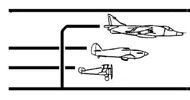| Name: | |
| Michael Frain | |
| Transcript: 1 | |
| ‘Hawkers’ in the early 1970s | |
Having worked in planned maintenance at Unilever, Michael here describes the prevailing culture he found at Hawker Siddeley. A management which was traditional in outlook and which had little understanding of profit-driven manufacturing. A static workforce that had little experience outside its own frame of reference and insulated from modern industrial practices. Nevertheless, times were changing and 1974 saw the introduction of the Health and Safety at Work etc. Act which, over time, was to have a major impact on manufacturing.One of the issues when I joined Hawker Siddley, as it was, was having a workforce – there was some lovely guys and women but it was mainly men. The sad thing that I discovered was that most of them had worked there ‘man and boy’ and had not experienced profit driven businesses like Unilever or the range of engineering skills and techniques that were being applied. In themselves the men were highly skilled but it was often in old engineering matters – it was old machinery. Most of the machinery because it was used on a one-off basis, not regular mass production, it could be seventy years old. The rubber press was a classic example and many other machines. But they were vast, we talk about machines but they would go from a basement or a pit almost up to the roof. And, but again they had their own procedures for working because you would have men below the machine in the ground in the pit with the hydraulics not realising when you were on top. So you had to be rather careful and start to introduce procedures. Sadly, I found there were not the recognition or the procedures that were really required from a modern industry. Now, I think it must be mentioned that this was 1974 when the new Health and Safety etc. Act came in regarding health and safety. 1974 this is one of the first pieces of really big health and safety legislation wasn’t it? And this really changed the whole regulatory framework of health and safety in industry which, you know, up till then and certainly my impression is in the Aerospace Industry, there had been a kind of a rather kind of casual acceptance of injury and in some cases even death. Yes, I would go along with what you’ve said. I think the more enlightened places like Unilever were generally abreast of it. So the shock of the 1974 legislation probably didn’t have the same impact as it did on the aviation business and particularly the old type factory that I was responsible for, and also I must add, Dunsfold Aerodrome. Do you want to just say something about the, you were talking about the kind of the culture in Hawker Siddeley. And one of the things you were saying was the workforce was quite resistant – they had their ways of doing stuff, which was related, shall we say, to the past. But then also management were also steeped in kind of tradition as well. Yes certainly, and I think there’s no better example than the way as executive, senior executive, I would go to Dunsfold and, on the engineering visits, meetings and so on and at lunchtime the senior executives would go off and it was like a country club. It was a house, an old house, a lovely old house outside the airfield, aerodrome. And it – I’ve never been in the forces or the RAF – but it reminded me very much of the type of experience in the ‘Mess’ that must have taken place. And no doubt it’s been carried over because, no doubt, a lot of the people of my ilk were members and experienced it and it carried on. So management, although they were in tune with aviation were not so much in tune with the factory, what made it tick. |
|


